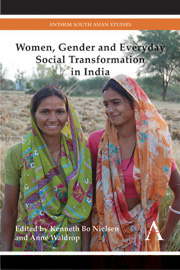Book contents
- Frontmatter
- Contents
- Acknowledgments
- Women and Gender in a Changing India
- PART I WORK, TECHNOLOGY, ASPIRATIONS
- PART II DEMOCRACY AND THE DEVELOPMENTAL STATE
- Chapter Seven Gender and Democratization: the Politics of Two Female Grassroots Activists in New Delhi
- Chapter Eight The Reproductive Body and the State: Engaging with the National Rural Health Mission in Tribal Odisha
- Chapter Nine A Veiled Change Agent: the ‘Accredited Social Health Activist’ in Rural Rajasthan
- Chapter Ten Disciplining Gender and Gendering Discipline: Women's Studies in Contemporary India
- PART III ASSERTIONS AND ACTIVISM
- About the Editors and Contributors
Chapter Seven - Gender and Democratization: the Politics of Two Female Grassroots Activists in New Delhi
from PART II - DEMOCRACY AND THE DEVELOPMENTAL STATE
Published online by Cambridge University Press: 05 October 2014
- Frontmatter
- Contents
- Acknowledgments
- Women and Gender in a Changing India
- PART I WORK, TECHNOLOGY, ASPIRATIONS
- PART II DEMOCRACY AND THE DEVELOPMENTAL STATE
- Chapter Seven Gender and Democratization: the Politics of Two Female Grassroots Activists in New Delhi
- Chapter Eight The Reproductive Body and the State: Engaging with the National Rural Health Mission in Tribal Odisha
- Chapter Nine A Veiled Change Agent: the ‘Accredited Social Health Activist’ in Rural Rajasthan
- Chapter Ten Disciplining Gender and Gendering Discipline: Women's Studies in Contemporary India
- PART III ASSERTIONS AND ACTIVISM
- About the Editors and Contributors
Summary
The role of women in Indian politics is changing. Whereas the public sphere of politics traditionally has been considered a male domain with politics consequently viewed as a male activity, a number of women now occupy leading political positions (Nielsen 2010). And due to the nationwide introduction of 33 per cent reserved seats for women in village and municipal councils since 1992 a large number of women all over India have – at least on paper – been drawn into political decision making. Lastly, whereas there has been a fairly active women's movement in India since the 1920s, this mainly consisted of middle-class women (Forbes 1998; Sen 2002); but now, however, we find an increasing number of poor women engaged in some form of political activism directed at other poor women.
In this chapter we take a bottom-up, gendered approach, and through detailed ethnography analyse the political activism of two female grassroots activists in New Delhi to discuss whether their activism can be regarded as expressing a trend of democratization of urban India. The fact that more women are engaged in politics might be viewed as a sign of a democratization of Indian society. At the same time, if elected women are not able to succeed in advancing their causes in council and parliament, or if grassroots activists are unable to mediate between people and formal political institutions, it may become a form of democratization in name only.
We take an explicitly gendered approach towards democratization both because we analyse the grassroots activism of two women and because through the analysis we try to flesh out the patriarchal nature of Indian politics. In the analysis of the two women’s political power we differentiate between how they function as local leaders and their influence through mediation. We show that whereas the women face explicit and implicit obstacles in terms of political mediation, they are quite successful in terms of political leadership and mobilization of fellow residents – in particular women – in their respective communities. These differences in the extent of their success, we argue, are directly linked to gender.
- Type
- Chapter
- Information
- Women, Gender and Everyday Social Transformation in IndiaA Revisionary History, pp. 105 - 122Publisher: Anthem PressPrint publication year: 2014



